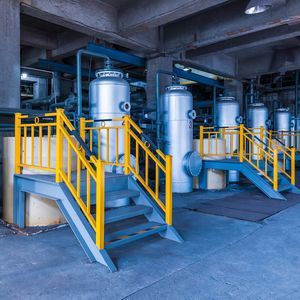Cleaner knows how to choose and use industrial filtration systems in 2025 for air, water and process fluids. Tool types, selection of checklists and top usage include.
In modern production, it is important to maintain clean air, water and fluids - not only for product quality, but also for the employee's safety and compliance with regulations. Industrial filtration systems act as the spine in pollution control, and ensure that the processes are run smoothly, the equipment is preserved, and the production industry meets the standards.
Whether your operation handles chemical production, food processing, power generation or wastewater treatment, the proper filtration system can significantly improve efficiency, reduce shutdown and support stability.
Benefits of Industrial Filtration System
Quality of increased product: Prevents contaminants that can alter product specifications
-
Equipment protection: Pumps, valves, and heat exchangers prevent failure, wear, and rust
-
Compliance compliance: Emissions and waste for air and water meet standards
-
Operating efficiency: Optimized components reduce shutdowns and maintenance over the equipment’s lifetime
-
Environmental and recycling: Ensures pure emissions and toxin removal
Types of Industrial Filtration Systems
| Filtration Type | What It Filters | Common Applications |
|---|---|---|
| Air Filters (HEPA, Bag) | Dust, fine particulates | HVAC, cleanrooms, cement plants |
| Water Filters | Solids, oils, chemicals | Cooling towers, wastewater systems |
| Oil/Mist Separators | Diesel, lubricant, metal chips | Machining and metalworking |
| Membrane Filters | Microbial, dissolved solids | Pharma, food, biotech |
| Cyclone & Cartridge Filters | Large particulates | Grain handling, bulk processing |
Key Applications of Filtration Systems
FAQ
Question: How often should the filter be replaced?
A: Replacement frequency depends on the contaminated volume and the media type and usually every 3-6 months or when the difference pressure increases to 25-30%.
Question: Increases high efficiency filter energy consumption?
A: High deficit filters such as HEPA can initially increase airflow resistance, but modern systems use adapted to residential and blow control to keep energy consumption moderate.
Question: Is filter recycled qualified?
A: Some filters are media recovery or biodegradable; However, the contaminated filters should be disposed of per safety rules.
Question: Can an industrial filtration system be retrofitted to existing lines?
A: Yes. Many systems are designed as modular additions to integrate with current pipelines, tanks or duct work.
Conclusion: Effective Filtration Supports Cleaner, Safer Industry
Industrial filtration systems play an important role in keeping system operations clean, safe and obedient. By choosing the right system - whether you are for air, oil or water - you can reduce shutdown, meet regulatory standards and high procedure can ensure reliability.
As new technologies such as AI monitoring and modular filter units, the filtration system will continue to develop systems - 2025 and beyond that to solve businesses that work more continuously and more efficiently.